The Jackery Solar Generator 2000 Plus - CleanTechnica Tested
This article was originally published on CleanTechnica.

Jackery has established itself as a quality provider of portable power stations and ready-to-go solar generators. The company has continued to increase the functionality offered in its units and the capacity they can store over the years.
On the heels of the rollout of the Jackery Solar Generator 3000 Pro, Jackery is introducing a new product category that allows customers to extend the utility and capacity of the system after purchase. Jackery reached out to us to see if we wanted to run the new Jackery Solar Generator 2000 Plus through the paces, and we gladly obliged. The kit is comprised of Jackery’s Explorer 2000 Plus Portable Power Station and 1 or more of its 200 watt SolarSaga panels.
Right out of the gate, the Jackery Solar Generator 2000 Plus looks a lot like the Explorer 3000 Pro, and rightfully so. It is packaged in the same external case as its higher capacity sibling, but has a few differences under the skin that set it apart. Notably, it boasts a pair of expansion ports that allow you to add up to a staggering 24 kilowatt-hours of storage capacity, rivaling many home backup batteries and far exceeding any other portable power station solution on the market.

The ability to add additional capacity to a portable power station base unit is a new capability that is being added to an increasing number of portable power stations, and Jackery is eager to stay on top of that trend. Additional capacity can be added by purchasing extra battery packs that come in two kilowatt-hour increments.
The Jackery Battery Pack 2000 Plus units can be purchased independently or as part of a bundle with the initial purchase. Buying them individually will set you back $1599 with slightly lower prices as part of most bundles. Jackery even offers a full 24 kilowatt-hour bundle right out of the gate, which pad two of the base stations with 10 additional battery packs and six of the 200 watt folding solar panels for $22,499.
Along with its ability to add capacity by connecting Jackery Battery Packs, the Solar Generator 2000 Plus boasts an impressive 6,000 watts of peak power output. That spec is absolutely at the top of its class and makes it harder to find appliances you can’t power with it than things that you can power with it. Plugging in a pair of Jackery’s Solar Saga 200 watt folding solar panels, the Jackery Solar Generator 2000 Plus can produce power wherever the sun shines, recharging in around 7 hours from solar in ideal conditions.
Charging The Jackery Solar Generator 2000 Plus
Connecting a pair of Jackery’s 200 watt SolarSaga panels to the unit, we saw production spike at 405 watts in the peak of the day. The panels themselves are impressive, folding up in to a compact 21″ x 24″ and just over 1.5″ thick. They boast a 24.3% efficiency, which means more power output per pound you have to carry around. The quad-fold system can be a bit awkward to set up, and we found it easiest to manage when setting one side on the ground and slowly unfolding the panels and legs, one at a time.
Recharge times improve if you chase the sun, changing the orientation of the panels throughout the day. Adding more panels will also slash recharging times.

Image credit: Kyle Field, CleanTechnica
As avid car campers, we love to take life on the road, and the Jackery Solar Generator 2000 Plus kit is more than up to the task. With its ability to add capacity and weight of 61.5 pounds, it is clearly designed as more of a base unit for stationary applications, but it is versatile and is a solid choice for an RV or van life power system. It does feature a luggage style extending handle and a solid pair of wheels that can be used to move it around, but care must be taken not to let its heavy weight cause any damage to it or your things.
Connecting it to a 12V automotive outlet, it recharged at just over 100 watts. Doing this in an EV puts a direct strain on the local low voltage battery, and in a combustion vehicle, puts additional strain on the vehicle’s alternator. It’s worth confirming what your vehicle’s system is capable of before connecting any portable power station for an extended period of time.

Being a larger unit and weighing in at 61.5 pounds, the Explorer 2000 Plus base unit is a solid choice for a stationary unit at home, pulling power from a standard AC plug. In this configuration, it can pull down a maximum of 1,800 watts. In the real world, we found this to be in the low 1,500 watt range. The charge rate fluctuates depending on the state of charge, but 1,500 watts is a very quick charge rate to pull from a standard AC outlet and will charge the unit up fully in a little less than 2 hours unless it’s fully drained.
Usage
Specs are great on paper, but we love putting these systems to the test to see how they perform in the real world. With the pack charged up, we put it to the test. We had a construction team building a wall in a remote part of our home and they needed power. Instead of running multiple extension cords, we brought the Jackery Explorer 2000 Plus base unit out and they plugged into that. It powered a variety of power tools over the course of the day with no issue.

Image credit: Kyle Field, CleanTechnica
Its 30 amp, 120 volt outlet on the front also makes this unit a solid choice for RV owners looking for a system to power all their goodies. It is worth noting that the outlet does not put out 240 volts, which does limit the applications it can power.
We connected up an array of high-draw kitchen appliances and found that even when we maxed them out a smoothie for lunch, some dough for dinner, and water for an afternoon coffee, it was more than up to the task. It pushed out nearly 1,900 watts in a task that even our home wall outlets would struggle to keep up with.

Image credit: Kyle Field, CleanTechnica
Overall
Jackery continues to show its mastery of the solar-powered portable power station space with the Solar Generator 2000 Plus. The flexibility contained in the main unit, combined with its 6,000 watt power output capability, make it one of the most impressive units available.
At $2,199, the Explorer 2000 Plus base unit is on the pricey side, but that’s to be expected for one of the most capable products from the dominant player in the market. It’s backed with a solid 5-year warranty and comes with the assurance that Jackery will take care of any issues that might come up down the line.
For more information about the Jackery Solar Generator 2000 Plus or to purchase one for yourself, head over to its official online info hub here.
Specs Of The Jackery Solar Generator 2000 Plus
-
MSRP:
- Jackery Explorer 2000 Plus: $2,199
- Jackery Solar Generator 2000 Plus w/2x 200 watt SolarSaga panels: $3,299
- Capacity: 2,043 Wh
- Weight: 61.5 lb / 27.9 kg
- Dimensions: Height: 14.7in (37.36cm), Width: 18.6in (47.3cm), Depth: 14.1in (35.94cm)
- Battery Cell Chemistry: LFP (LiFePO4 battery)
- Cycle Life: 4000 cycles to 70%+ capacity
- AC Input: 120V, 60Hz, 15A Max
- DC Input: Single Input: 11V-17.5V at up to 8A, Two Inputs: 17.5V-60V @ 8A (12A Max), Four Inputs: 60V @ 24A Max
- AC Output: 120V~ 60Hz @ 20A Max, AC Output(×1): 120V~ 60Hz @ 25A Max, AC Total Output: 3,000 W Max, 6,000 W surge peak
- AC Outlets: 4 AC outlets
-
DC Outlets:
- USB-A (2): Quick Charge 3.0 outlets, 18W Max
- USB-C (2): 100W Max, (5V, 9V, 12V, 15V, 20V up to 5A)
- 12V Auto Outlet (1): 12V @ 10A
-
Charging Time (0-100%):
- AC Adapter: 2 Hours
- Car Adapter(12V): 25 Hours
-
Solar Panels:
- Explorer 2000 Plus with 2x SolarSaga 200W: 7 hours
- Explorer 2000 Plus with 4x SolarSaga 200W: 3.8 hours
- Explorer 2000 Plus with 6x SolarSaga 200W: 2 hours
Disclaimer:
The runtime mentioned for appliances powered by Jackery is for reference only. Actual runtime may vary under different conditions. Please refer to real-world performance for accurate results.

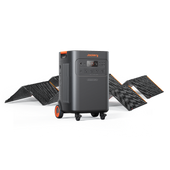











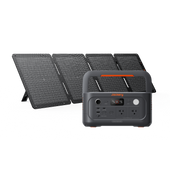





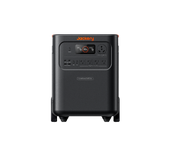






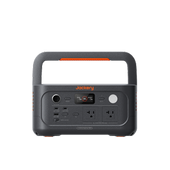





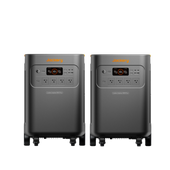
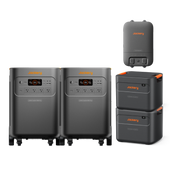





![[Add - on] Jackery Manual Transfer Switch for Explorer 5000 Plus - Jackery](http://www.jackery.com/cdn/shop/files/add-on-jackery-manual-transfer-switch-for-explorer-5000-plus-9017324.png?v=1754016782&width=170)










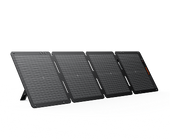

























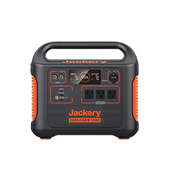







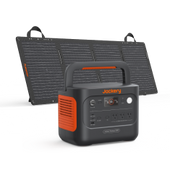
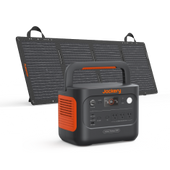





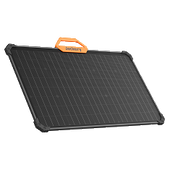



































Leave a comment